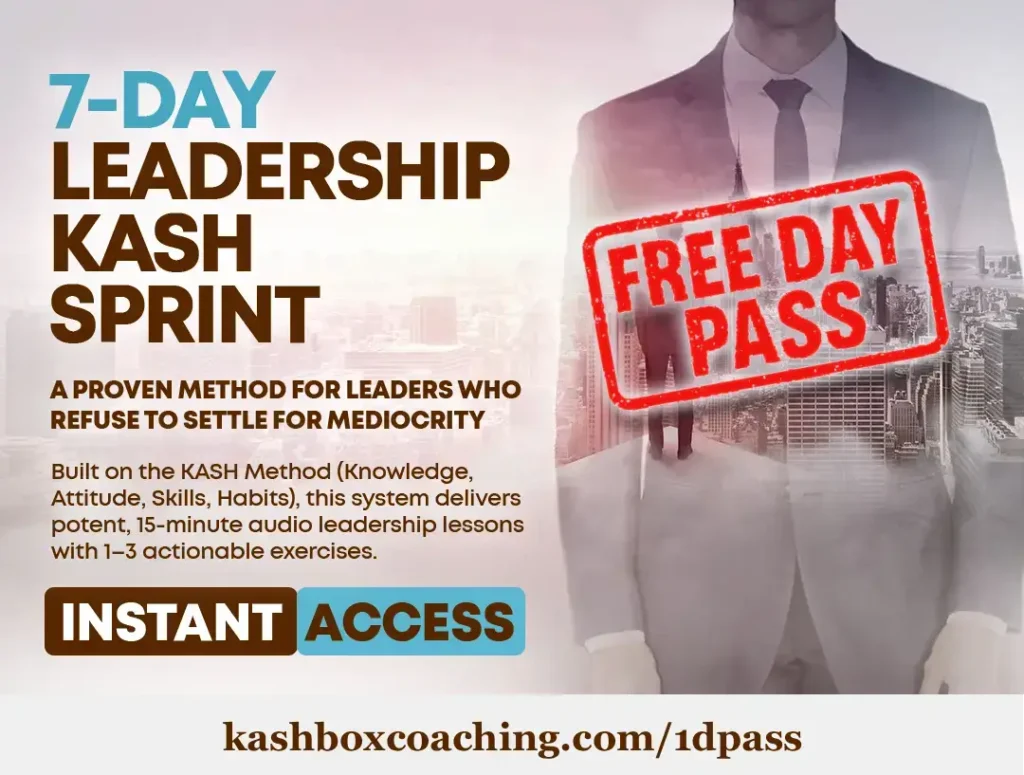In high-performing organizations, feedback is more than a performance tool—it’s a growth catalyst. Yet too often, leaders either avoid giving feedback for fear of conflict or deliver it in vague, non-actionable ways that leave the recipient uncertain and unmotivated.
Clear, actionable feedback is the bridge between potential and performance. It ensures that employees not only understand what needs to improve but also have a path to get there. The **KASH Method—Knowledge, Attitude, Skills, and Habits—**offers leaders a proven framework for delivering feedback that drives measurable results.
Knowledge – Be Clear on the Facts
Great feedback starts with clarity. Leaders must base feedback on specific, observable facts rather than assumptions or opinions. Knowledge means you’ve done your homework—you understand the situation, the impact, and the expectations.
Instead of saying, “You need to be better in meetings,” a knowledge-based approach would be: “In the last three client calls, you spoke less than once per meeting. Our goal is to demonstrate active engagement to build trust with clients.”
Leadership Tip: Keep feedback anchored to documented behaviors and agreed-upon goals, not personality traits or vague impressions.

Ready to Find Your Perfect Kashbox Coach?
Every executive and business leader has unique strengths and faces specific challenges. That’s why we offer a diverse team of experienced coaches, each with specialized expertise in different areas of leadership coaching.
Click the button below to match with a Kashbox Coaching leadership coach who can best help you unlock your full potential.
Attitude – Deliver with Empathy and Respect
Feedback is as much about how it’s received as how it’s given. Your attitude shapes the emotional tone of the conversation. Leaders with the right mindset see feedback as a form of support, not criticism, and communicate it with empathy.
Instead of a punitive tone, use one that says, “I believe in your potential, and I’m here to help you succeed.” This fosters trust and openness, increasing the likelihood of behavior change.
Leadership Tip: Assume positive intent and position feedback as a mutual investment in growth.
Skills – Communicate for Clarity and Action
Delivering feedback well is a learned skill. It requires choosing the right timing, framing the message clearly, and linking it to actionable next steps. The SBI model—Situation, Behavior, Impact—can help: describe the situation, the specific behavior, and its impact on the team or organization.
Example: “In yesterday’s team meeting (Situation), you interrupted twice while others were speaking (Behavior), which caused frustration and slowed decision-making (Impact).” Then, add the “Next Step” for improvement.
Leadership Tip: Practice feedback delivery in coaching sessions or leadership development programs to sharpen this skill.

5 Powerful Secrets of High-Performing Leaders
✓ 4 Strategic Wins for instant clarity and execution
✓ Beat Parkinson’s Law to dominate your schedule
✓ Optimize Your Energy for unstoppable productivity
✓ Read to Lead to accelerate personal and career growth
✓ Proven Learning Method that cements breakthroughs
Habits – Make Feedback Continuous
Feedback is most powerful when it’s consistent, not an annual event. Leaders who make feedback a habit create an environment where improvement is constant, not reactive. This normalizes feedback and reduces defensiveness.
Leadership Tip: Build feedback into weekly check-ins, project debriefs, and informal conversations so it becomes part of the team’s rhythm.
The KASH Payoff
When leaders combine Knowledge (facts), Attitude (respect), Skills (clear delivery), and Habits (consistency), feedback transforms from a dreaded task into a driver of engagement, performance, and trust.
Clear, actionable feedback isn’t just about correcting mistakes—it’s about unlocking potential. Leaders who master the KASH Method don’t just give feedback; they create a culture where feedback fuels growth at every level.

As the President of Kashbox Coaching my mission is to empower leaders by highlighting their unique strengths and unlocking their leadership potential – to develop all quadrants of their Kashbox (Knowledge, Attitude, Skills, Habits)!
For over 15 years, Hannah Kay Herdlinger has empowered individuals to unlock their full potential and design fulfilling careers and lives. She championed leadership at Sheryl Sandberg’s Lean In and Arianna Huffington’s Thrive Global.
The KASH Method, created by the founder of Kashbox Coaching, offers leaders a unique path to success and positive change. It goes beyond traditional coaching by integrating leadership development, resilience training, and the power of connection to elevate client experiences.
Hannah Kay’s passion is igniting positive and lasting transformations. Through executive, corporate, and individual coaching, she helps clients align professionally. Her journey is a testament to the transformative power of coaching. Her unwavering commitment to empowering others is evident in her own growth and the success of her clients.













